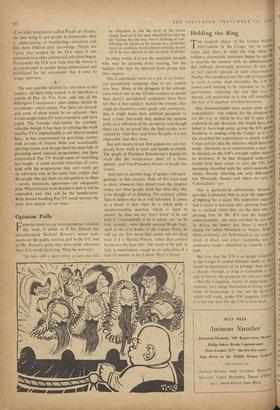Opinion Polls
FRom his letter in .our correspondence columns this week, it seems as if Dr. Durant has misunderstood Richard Rovere's recent Com- ments on the public opinion poll in the US; and as Mr. Rovere's point may have some relevance here, it is worth clarifying. What he said was:
The man with a secret ballot to cast may feel
no obligation to ride the wave of the future simply becauselt has been identified for him by Dr. Gallup, but the man who is thinking of con- tributing his talents or his money to a particular cause or candidate would almost certainly be put off if he was advised of the certainty of defeat.
In other words, it is not the candidate himself who may be deterred from running, but his backers who may be deterred from giving him their support.
This is admittedly more of a risk in an Ameri- can presidential campaign than in •any contest over here. Many of the delegates to the conven- tions which met in the US this summer to decide their party's presidential candidates must have felt that if they publicly backed the winner, they might do themselves some good; and, conversely, that it might harm their political prospects to back a loser. Inevitably they studied the opinion polls, as a reflection of the prospects; and though there can be no proof that the final results were swayed by what they read from the polls, it is not impossible that they were.
But poll results reveal that popularity can vary greatly from week to week and month to month. The graph of President Eisenhower's popularity reads like the temperature chart of a fever patient : and Vice-President Nixon's is hardly less erratic.
And there is another snag, of greater relevance, perhaps, in this country. Polls of this kind tend to show, whenever they depart from the simplest issues, not what people think but what they like to be thought of as thinking. The ordinary citizen likes to believe that he is well informed. It comes as a shock to him when he is asked quite a simple-sounding question which is hard to answer; he does not say 'don't know' if he can help it. Consequently if he is asked, say—as he was, recently—who should succeed Hugh Gait- skell as the next leader of the Labour Party, he will say the first name that comes into his head even if it is Harold Wilson. rather than confess he has not the least idea. The result of the poll, in fact, is meaningless, except as an indication of a lack of interest in the Labour Party's future.


































 Previous page
Previous page